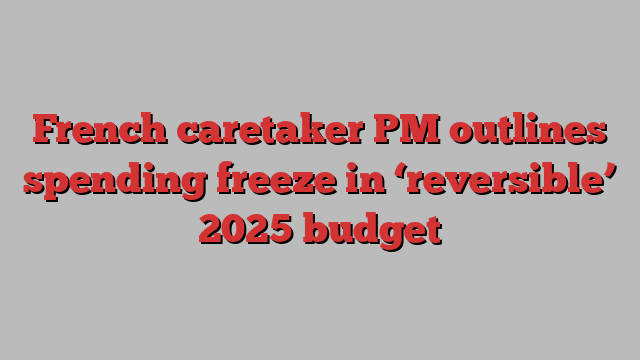
Unlock the Editor’s Digest for free
Roula Khalaf, Editor of the FT, selects her favourite stories in this weekly newsletter.
France’s caretaker government has said it plans to freeze state spending as it outlines the contours of a 2025 budget, but has also admitted that a new prime minister to be named by President Emmanuel Macron might reverse the proposals.
Outgoing Prime Minister Gabriel Attal has sent letters to each ministry outlining allocations for next year in what his office called a “reversible budget”. Attal resigned last month after parliamentary elections, but is staying on until a new premier is appointed.
Attal’s plan, launched more than a month before the October 1 deadline, marks the first time that a caretaker prime minister and his cabinet have prepared a budget for their successors in this way under France’s Fifth Republic, reflecting the unusual state of flux in French politics.
July’s snap elections resulted in a hung parliament, giving no group a clear majority. Any decisions on the budget taken now are therefore likely to be changed, perhaps substantially, by the next government.
Attal’s caretaker government has said it will keep 2025 state spending at 2024 levels of €492bn, the prime minister’s office said, which would save about €10bn after taking inflation into account and help to keep the country’s deficit reduction on track.
“This is a reversible budget, which allows France to have a budget on time, but which will also allow the next government to make its own choices on the basis of what has been prepared and transmitted to the ministries,” one senior official said, adding that unchanged spending in nominal terms was essential for restoring public finances.
The budgets for defence, culture and sports would be prioritised, the prime minister’s office said, while there should be savings on work and employment given the relatively low unemployment rate.
France is under pressure from international debt markets and from the EU to control its public spending after it revealed in January that its deficit was wider than expected last year, at 5.5 per cent of gross domestic product compared to a forecast of 4.9 per cent.
The country has not balanced its budget in decades, but the overshoot was a blow to Macron’s credibility on stewardship of the economy. Worries about France’s public debt trajectory prompted a downgrade to the country’s credit rating from agency S&P Global Ratings and triggered a sanctions procedure by the European Commission in June.
Macron has yet to name a prime minister to attempt to form a government, and will meet party leaders and other politicians at the Elysée on Friday before announcing his choice.
The Nouveau Front Populaire — an alliance of leftist parties that won the largest number of National Assembly seats in the election but is well short of a majority — has been pressing Macron to appoint its candidate Lucie Castets, a civil servant, to the post.
Macron and his allies have so far resisted, arguing that the NFP does not have enough seats to form a stable government and attacking the presence in the alliance of the far-left La France Insoumise and its firebrand leader Jean-Luc Mélenchon.
While Castets and other more moderate members of the alliance have signalled some openness to compromise in order to govern, the NFP’s radical tax-and-spend economic agenda diverges widely from the position put forward by the Macronists on the budget.
“Carrying out an austerity policy in the current context seems inappropriate and irresponsible to me,” Castets said in an interview with French newspaper Libération on Wednesday. “This is more dogma than economic logic.”
“We are working on the subject and we will be able to make important corrections before the budget vote,” she added.